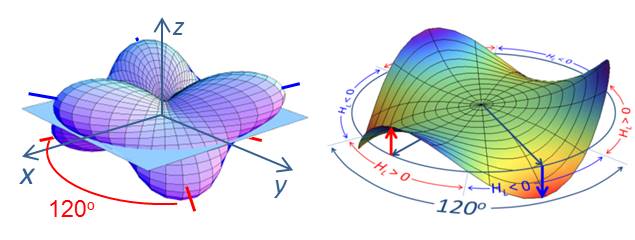
It is the aim of this project to continue the study of SMMs of low-nuclearity, for which three different classes of molecules have been chosen in view of obtaining a variety of intrinsic properties as a key experimental variable:
Polynuclear SMMs of trigonal symmetry: The extended family of Mn3 SMMs presents an ideal opportunity to explore the consequences of a trigonal spin topology for the QTM. Recent results by our group, in collaboration with Euen Brechin (UE, Edinburg, Scothland) have giventhe first evidence of a threefold modulation of the QTM probability in a Mn3 molecule (PRL-2014). Complementary trigonal quantum interference patterns are observed for opposite QTM resonance polarities. In addition, our results evidence a remarkable three-fold modulation of the hard anisotropy plane present in this molecule (as sketched in the figure above), due to an effective intrinsic field resulting from the commutation between the axial and third-order transverse spin operators in the trigonal transverse anisotropy interaction.
Asymmetric molecular dimers: In view of the potential use for SMMs in quantum information processes, the ideal molecule would consist of a dimer of non-identical exchange-coupled spins such that a unique applied magnetic field would make the levels of the two spins distinguishable and allow the independent manipulation of each unit upon controlled external stimuli (e.g., microwave pulses). Lanthanide ions stand out as promising candidates for encoding quantum information, so a natural conclusion is to look for molecules comprised of just two weakly-coupled lanthanide qubits to use as elements of a quantum gate. However, the synthesis of asymmetric molecular dimers is not straightforward, as nature tends to make them symmetric. We are collaborating with the groups of Guillem Aromi (UB, Barcelona, Spain) and Fernando Luis (UZ, Zaragoza, Spain) on this project.
Mononuclear Single-Molecule Magnets: As a new paradigm in the field of molecular magnetism, this new class of systems arises as a potential candidate to replace polynuclear SMMs in the race towards technological applications. At present, there is relatively little understanding of the spin Hamiltonian governing the quantum dynamics in mononuclear SMMs. This is particularly true of Ln-based POMs due orbital contributions to the magnetism and the resultant large zero-field splittings. The accurate determination of the energy landscape associated with the total angular momentum J of the molecules, the nature of the spin-orbit coupling, the symmetry of the magnetic anisotropy, as well as the wave functions describing the energy states of mononuclear SMMs are essential for understanding and manipulating the quantum tunneling dynamics and for assessing the potential of the molecule to act as a qubit or as part of a spintronics device. We collaborate with Eugenio Coronado (UV, Valencia, Spain) in this project.
Recent Works on this topic:
M. Fix, J.H. Atkinson, P.C. Canfield, E. del Barco, and A. Jesche
“Extreme Field Sensitivity of Magnetic Tunneling in Fe-Doped Li3N “
Phys. Rev. Lett. 120, 147202 (2018) (*highlighted as Editor’s Suggestion)
J. H. Atkinson, R. Inglis, E. del Barco, and E. K. Brechin
“Three-Leaf Quantum Interference Clovers in a Trigonal Single-Molecule Magnet”
Phys. Rev. Lett. 113, 087201 (2014)
H. M. Quddusi, J. Liu, S. Singh, K. J. Heroux, E. del Barco, S. Hill, and D. N. Hendrickson
“Asymmetric Berry-Phase Interference Patterns in a Single-Molecule Magnet”
Phys. Rev. Lett. 106, 227201 (2011)
J. J. Henderson, C. Koo, P. L. Feng, Enrique del Barco, Stephen Hill, I. S. Tupitsyn, P. C. E. Stamp and David N. Hendrickson
“Manifestation of Spin Selection Rules on the Quantum Tunneling of Magnetization in a Single-Molecule Magnet”
Phys. Rev. Lett. 103, 017202 (2009)
Other publications by the group
Collaborators in this project:
Physics:
Stephen Hill (FSU, Tallahassee, USA)
Fernando Luis (UZ, Zaragoza, Spain)
Paul Canfield (Ames Lab, USA)
Anton Jesche (UA, Augsburg, Germany)
Chemistry:
Euen Brechin (UE, Edinburg, Scothland)
Guillem Aromi (UB, Barcelona, Spain)
Eugenio Coronado (UV, Valencia, Spain)
Selvan Demir (Michigan, US)